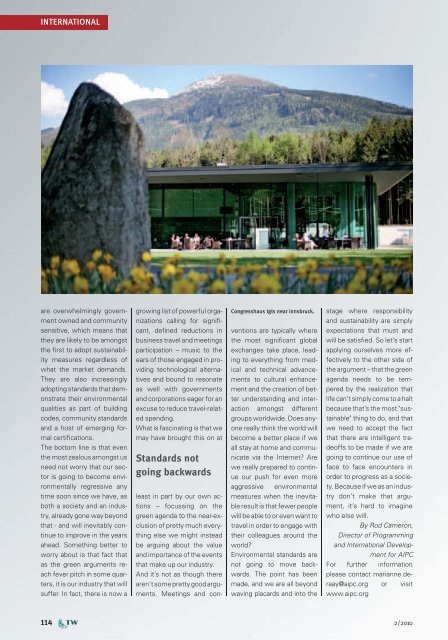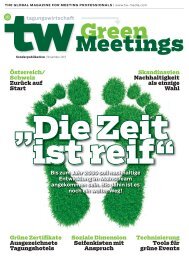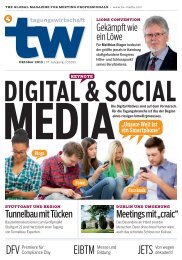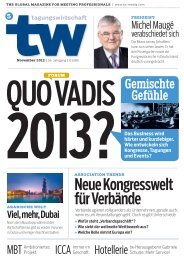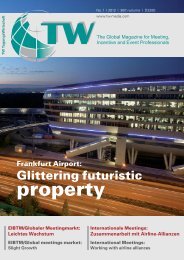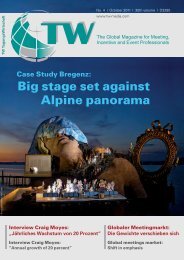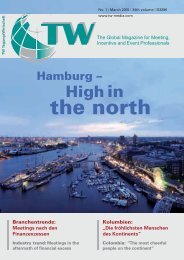financial excesses
financial excesses
financial excesses
- TAGS
- excesses
- www.tw-media.com
Sie wollen auch ein ePaper? Erhöhen Sie die Reichweite Ihrer Titel.
YUMPU macht aus Druck-PDFs automatisch weboptimierte ePaper, die Google liebt.
INTERNATIONAL<br />
are overwhelmingly government<br />
owned and community<br />
sensitive, which means that<br />
they are likely to be amongst<br />
the first to adopt sustainability<br />
measures regardless of<br />
what the market demands.<br />
They are also increasingly<br />
adopting standards that demonstrate<br />
their environmental<br />
qualities as part of building<br />
codes, community standards<br />
and a host of emerging formal<br />
certifications.<br />
The bottom line is that even<br />
the most zealous amongst us<br />
need not worry that our sector<br />
is going to become environmentally<br />
regressive any<br />
time soon since we have, as<br />
both a society and an industry,<br />
already gone way beyond<br />
that - and will inevitably continue<br />
to improve in the years<br />
ahead. Something better to<br />
worry about is that fact that<br />
as the green arguments reach<br />
fever pitch in some quarters,<br />
it is our industry that will<br />
suffer. In fact, there is now a<br />
growing list of powerful organizations<br />
calling for significant,<br />
defined reductions in<br />
business travel and meetings<br />
participation – music to the<br />
ears of those engaged in providing<br />
technological alternatives<br />
and bound to resonate<br />
as well with governments<br />
and corporations eager for an<br />
excuse to reduce travel-related<br />
spending.<br />
What is fascinating is that we<br />
may have brought this on at<br />
Standards not<br />
going backwards<br />
least in part by our own actions<br />
– focussing on the<br />
green agenda to the near-exclusion<br />
of pretty much everything<br />
else we might instead<br />
be arguing about the value<br />
and importance of the events<br />
that make up our industry.<br />
And it’s not as though there<br />
aren’t some pretty good arguments.<br />
Meetings and con-<br />
Congresshaus Igls near Innsbruck.<br />
ventions are typically where<br />
the most significant global<br />
exchanges take place, leading<br />
to everything from medical<br />
and technical advancements<br />
to cultural enhancement<br />
and the creation of better<br />
understanding and interaction<br />
amongst different<br />
groups worldwide. Does anyone<br />
really think the world will<br />
become a better place if we<br />
all stay at home and communicate<br />
via the Internet? Are<br />
we really prepared to continue<br />
our push for even more<br />
aggressive environmental<br />
measures when the inevitable<br />
result is that fewer people<br />
will be able to or even want to<br />
travel in order to engage with<br />
their colleagues around the<br />
world?<br />
Environmental standards are<br />
not going to move backwards.<br />
The point has been<br />
made, and we are all beyond<br />
waving placards and into the<br />
stage where responsibility<br />
and sustainability are simply<br />
expectations that must and<br />
will be satisfied. So let’s start<br />
applying ourselves more effectively<br />
to the other side of<br />
the argument – that the green<br />
agenda needs to be tempered<br />
by the realization that<br />
life can’t simply come to a halt<br />
because that’s the most "sustainable"<br />
thing to do, and that<br />
we need to accept the fact<br />
that there are intelligent tradeoffs<br />
to be made if we are<br />
going to continue our use of<br />
face to face encounters in<br />
order to progress as a society.<br />
Because if we as an industry<br />
don’t make that argument,<br />
it’s hard to imagine<br />
who else will.<br />
By Rod Cameron,<br />
Director of Programming<br />
and International Development<br />
for AIPC<br />
For further information<br />
please contact marianne.deraay@aipc.org<br />
or visit<br />
www.aipc.org<br />
114 2/2010


